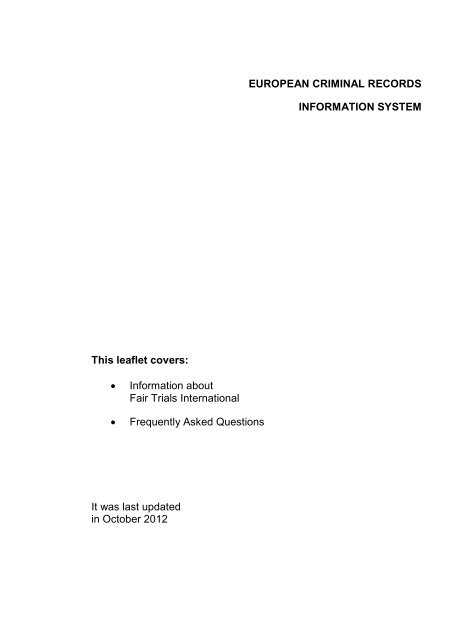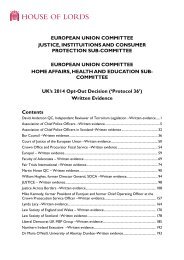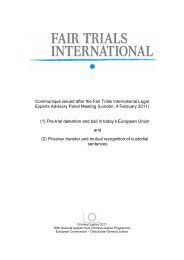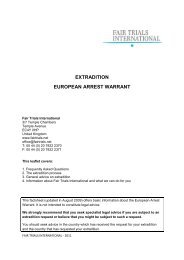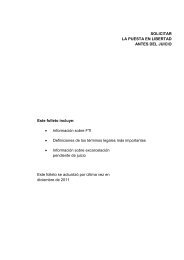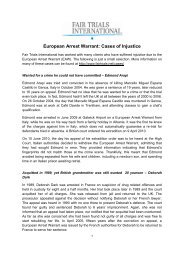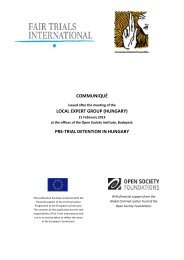EUROPEAN CRIMINAL RECORDS INFORMATION SYSTEM This ...
EUROPEAN CRIMINAL RECORDS INFORMATION SYSTEM This ...
EUROPEAN CRIMINAL RECORDS INFORMATION SYSTEM This ...
You also want an ePaper? Increase the reach of your titles
YUMPU automatically turns print PDFs into web optimized ePapers that Google loves.
<strong>EUROPEAN</strong> <strong>CRIMINAL</strong> <strong>RECORDS</strong><strong>INFORMATION</strong> <strong>SYSTEM</strong><strong>This</strong> leaflet covers:Information aboutFair Trials InternationalFrequently Asked QuestionsIt was last updatedin October 2012
About Fair Trials InternationalSince 1992 Fair Trial International has worked for thebetter protection of fair trial rights and defended therights of people facing criminal charges in a countryother than their own. Our vision is a world where everyperson’s right to a fair trial is respected, whatever theirnationality, wherever they are accused.Fair Trials International was established to help peoplearrested outside their own country to defend their right toa fair trial. Every year we help hundreds of people andtheir families to navigate a foreign legal system byoffering practical advice, including contacts of locallawyers; guidance on key issues encountered by peoplearrested abroad; and basic information on different legalsystems and local sources of support. As a charity, wedo not charge for any of the assistance that we provide.We believe that respect for fundamental rights and therule of law are the hallmarks of a just society and thatthe right to a fair trial is at the heart of this. Sadly toomany shocking cases of injustice demonstrate how, timeand again, this most basic human right is beingabused. We fight against injustice by lobbying for thelegal reforms needed to ensure that the right to a fairtrial is respected in practice. Working with our clientsand international networks, we also campaign forchanges to criminal justice laws which are being abusedand overused.To find out more about how FTI can assist you, pleasecontact our legal team (contact details on the backcover).2Fair Trials International – September 2011<strong>This</strong> note is intended to be for information purposes only anddoes not constitute legal advice. Take local legal advice on yourspecific situation.
Fair Trials International is a registered charity (No1134586) and is registered with limited liability inEngland and Wales (No 7135273). We are a nongovernmentalorganisation; as such, we are a whollyseparate and independent organisation from the Foreignand Commonwealth Office.If you require this leaflet in large print,please contact us at the address on theback cover.3Fair Trials International – October 2012<strong>This</strong> note is intended to be for information purposes only anddoes not constitute legal advice. Take local legal advice on yourspecific situation.
FREQUENTLY ASKED QUESTIONSPlease see below brief answers to some of the mostcommonly asked questions about the European CriminalRecords Information System (or ‘ECRIS’).Q1. What is ECRIS?ECRIS, or the European Criminal Records InformationSystem, is a system for sharing criminal records inEurope. It means that if you commit a crime in a countrywithin the EU which you are not a national of, the detailsof that crime will be sent to your home country andentered on your criminal record. For example, if a Britishperson is convicted of a crime in Spain, then theSpanish authorities will send details of that crime to theUK where they will be stored on the local criminalrecords system. The UK will then have information aboutthe conviction in Spain, and any other convictions fromthe rest of Europe, and in certain circumstances mustsend details of these to another EU country whenrequested to do so.Q2. Is ECRIS a European database with all ourcriminal records on?No, ECRIS is not a centralised database; it is a methodby which different EU countries will be able to gainaccess to each other’s databases. Rather than keepingall records in one place, ECRIS will mean that every EUcountry will have a central authority which will store allthe criminal records of its citizens from across Europeand will send them to other countries on request.4Fair Trials International – October 2012<strong>This</strong> note is intended to be for information purposes only anddoes not constitute legal advice. Take local legal advice on yourspecific situation.
Q3. Why was ECRIS introduced?In the past, if you were convicted of a crime the onlycountry that would automatically know about it would bethe one that you were convicted in. <strong>This</strong> meant that if aperson committed many crimes in lots of differentcountries, this information may only be held in thecountry that convicted them and the person could simplytravel to another state and re-offend without theauthorities being aware of their past. ECRIS wasintroduced to make sure that when people are convictedof a crime, the authorities know about all of theirprevious convictions. <strong>This</strong> could have an effect onsentencing where a person has a history of committing aparticular crime – it would be unfair if someone who hascommitted burglary numerous times in several EUcountries was treated as a first-time offender simplybecause the convicting country was not aware of theirpast. It will also help ensure that in a Europe withoutborders someone working with vulnerable people orchildren will not be able to hide previous crimes simplybecause they were committed in another Member State.Q4. What happens when I get a conviction inanother EU country?The ECRIS system gives each type of crime its owncode. If you are convicted of a crime within the EU, thecountry where you are convicted will select the mostappropriate code and transmit this to your home state. Itmay include more information about the conviction, forexample any particular circumstances that resulted inyou getting a more severe or lenient sentence orwhether you have shown remorse, but it does not have5Fair Trials International – October 2012<strong>This</strong> note is intended to be for information purposes only anddoes not constitute legal advice. Take local legal advice on yourspecific situation.
to. Your home state has a duty to store all theinformation sent to it under ECRIS. If your home countrywants to know more about the details of your convictionthey can make a request for it.Q5. Who can see my conviction? If I am arrestedin another European country will they be able tosee what is on my record?Yes. If an EU country applies to see your criminal recordbecause you are involved in criminal proceedings, thenyour home country will have to disclose all of yourprevious convictions regardless of what country they arefrom. There are no exceptions to this.Q6. If I apply for a job anywhere in the EU, willmy prospective employer now be able to seeeverything on my record?The rules on who can and can’t see your record forpurposes other than criminal proceedings are quitecomplicated and will ultimately depend on the relevantcountry’s laws. Generally speaking, ECRIS will make itmore likely that a prospective employer will be able tosee your previous convictions.There are various options depending on yourcircumstances:If you have been convicted in your home country,then your home country’s national laws willdetermine whether your conviction can be sharedwith any prospective employer. So, if a UK nationalis convicted of a crime in the UK and applies for a6Fair Trials International – October 2012<strong>This</strong> note is intended to be for information purposes only anddoes not constitute legal advice. Take local legal advice on yourspecific situation.
job in France, the UK authorities will use UK law todecide whether to disclose those convictions if arequest is received.If you are convicted in another country, then thecountry you are convicted in can choose to place arestriction on your conviction so that it cannot beshared with anyone else unless it is for the purposesof criminal proceedings. Anyone else who wants toknow about this previous conviction, for example aprospective employer, would have to make arequest to the country that convicted you to obtainthis information. <strong>This</strong> country will decide whether ornot to disclose the information in accordance with itsown national laws.If the country you committed the crime in does notinclude any restriction on the sharing of theinformation about your conviction, then the requestis made to your home country which will follow itsown national laws when deciding what to disclose.Once the information has been requested for onepurpose it cannot be used for anything else. If anyoneneeds the information for another reason, they wouldhave to request it again.Q6. I have citizenship in more than one EUcountry, which country will my convictioninformation go to?If you are a national of more than one EU country,information about any conviction you get will be sent toeach of the countries you are a national of. <strong>This</strong> would7Fair Trials International – October 2012<strong>This</strong> note is intended to be for information purposes only anddoes not constitute legal advice. Take local legal advice on yourspecific situation.
still be the case if you committed a crime in one of yourhome countries – the information would be sent to all ofthe others.Q7. I am a UK national and years ago I wasconvicted of a crime in Spain. Will this crimenow be on my criminal record in the UK?Spain will not send the UK the details of the crimethrough ECRIS as the crime happened before 27 April2012. However, the offence may already be on yourcriminal record in the UK if, for example, the UK hasspecifically requested this information from Spain.Q8. I am a Dutch national and last year I wasarrested and given a caution in the UK. I neverwent to trial so will details about the caution besent to the Netherlands? What counts as aconviction?In ECRIS, a conviction is defined as the decision of acriminal court against you in respect of any criminaloffence where it would have been put on the criminalrecord of the convicting country. On a strict reading thiswould mean that if you have not been convicted in acriminal court then no information should be transmitted.However, draft guidance on ECRIS has suggested thatconviction may also include any final decisions by a“competent authority” if this too is recorded in thecriminal record. <strong>This</strong> may mean that, as the caution isincluded on a criminal record in the UK, it would be sentto Holland. We will have to wait and see how MemberStates interpret the meaning of conviction to knowexactly what will be transmitted and what will not.8Fair Trials International – October 2012<strong>This</strong> note is intended to be for information purposes only anddoes not constitute legal advice. Take local legal advice on yourspecific situation.
Q9. I am a British national and the crime Icommitted in Italy is not a crime in the UK, will itstill be on my criminal record?If you are convicted of a criminal offence in Italy, thedetails of this offence will be transferred to the UK. TheUK must store this information in accordance withECRIS and must provide it to anybody from anotherMember State who properly requests it. <strong>This</strong> means thatyou may end up with a criminal record in the UK eventhough the act you were convicted for in Italy isn’t illegalin the UK.Q10. How long will a foreign conviction stay onmy record?It is not clear exactly how the system for removingconvictions from records will work, but it will probablydepend on the laws of the country where you areconvicted.For example, if you are a UK citizen and you commit acrime in Belgium, then any changes or deletion ofinformation to the record you have in Belgium will beimmediately transferred back to the UK and the UK willhave to make an identical change or deletion on theinformation stored on your UK record. <strong>This</strong> means that ifthe offence is removed from your Belgian record after 5years, and another country, such as Spain,subsequently asks the UK for your criminal record forthe purposes of criminal proceedings, your conviction inBelgium will not show up. <strong>This</strong> is the case even if the9Fair Trials International – October 2012<strong>This</strong> note is intended to be for information purposes only anddoes not constitute legal advice. Take local legal advice on yourspecific situation.
same offence, if committed in the UK, would stay onyour criminal record for 20 years.However, if the reverse is true and a Belgian commitsthe same crime in the UK, that offence will remain onrecord in Belgium for 20 years even though it wouldhave been deleted after 5 years had the crime takenplace in Belgium.There is a lack of clarity in the ECRIS legislation as towhether the UK would also have to take any change ordeletion into account for the purposes of your domesticcriminal record as it applies in the UK. It may be that itdoes not, and that the conviction could remain on yourrecord for the purposes of criminal proceedings or otherrequests within the UK.Q11. I am a US citizen living in France, will anycrimes I commit in the EU go on my US record ormy French record?ECRIS does not govern relations between EU MemberStates and other countries and does not apply toconvictions of nationals from third countries. Whetherany record you have in France, or any other EU country,is sent to the US will depend entirely on US law, the lawof the country where you are convicted, and anyagreements that country may have entered into with theUS. These arrangements will be different for everycountry.There are discussions currently underway in Europe toextend the ECRIS system and supplement it with acentralised “European index of convicted third country10Fair Trials International – October 2012<strong>This</strong> note is intended to be for information purposes only anddoes not constitute legal advice. Take local legal advice on yourspecific situation.
nationals” so that the ECRIS safeguards extend topeople who are not nationals of the EU. These plans arein the early stages and are not yet confirmed.Q12. Am I allowed to access information on mycriminal record and see what offences havebeen put on it?You are allowed to put in a request through ECRIS tosee information on your own record. To do this you haveto be a resident or national of either the country youmake the request in or the country you make the requestto. You must make this request through the centralauthority of the country you are living in which will in turnmake a request to your home state. So, for example, if aFrench person is living in the UK then they could make arequest to either the UK authorities to ask France fortheir criminal record or to the French authorities directly.Whether or not you are given access to the record isgoverned by the national laws of the states concerned,so there is no right to receive the information.Q13. Is my personal data protected duringtransfers between Member States and while it isbeing stored?There are no provisions in the underlying legislationgoverning how data transferred through ECRIS is goingto be protected. Instead, the protection level will bedecided by each Member State in accordance withexisting EU data protection legislation. <strong>This</strong> may be anissue as in some EU countries data protection standardsare not as robust as others and information could bestored in a way that leaves it vulnerable to hackers and11Fair Trials International – October 2012<strong>This</strong> note is intended to be for information purposes only anddoes not constitute legal advice. Take local legal advice on yourspecific situation.
identity thieves. The European authorities haveacknowledged that EU data protection laws are noteffective enough and in early 2012 they put forward newproposals to improve data protection in the EU.Please note that at the time of writing ECRIS has notbeen fully implemented in all EU Member States. Thepractical operation of the system in some countries maynot therefore be as represented in this note and maychange over time. If you would like to share yourexperience of the ECRIS system please emailEmily.Smith@fairtrials.net.12Fair Trials International – October 2012<strong>This</strong> note is intended to be for information purposes only anddoes not constitute legal advice. Take local legal advice on yourspecific situation.
<strong>This</strong> leaflet was last updated in September 2011. Theinformation contained in this document is providedfor information purposes only and is not intended aslegal advice, nor does it constitute legal advice.Whilst we endeavour to keep the information up todate and correct, Fair Trials International makes norepresentations or warranties of any kind, expressor implied about the completeness, accuracy,reliability, suitability or applicability to individualcases of the information contained in this leaflet.Any reliance you place on such material is thereforestrictly at your own risk. Fair Trials Internationaldisclaims any liability to the fullest extentpermissible by law for any loss or damage of anykind arising from the use of the informationprovided. You should always seek professional legaladvice from a lawyer qualified to practice in thejurisdiction you are in.If you think that an important question is notcovered in this factsheet, please let us know.13Fair Trials International – October 2012<strong>This</strong> note is intended to be for information purposes only anddoes not constitute legal advice. Take local legal advice on yourspecific situation.
Working for a world where every person’s right to afair trial is respected, whatever their nationality,wherever they are accusedTHANK YOUFair Trials International would like to thank the law firmsand individual practitioners, both in the UK and abroad,who have generously given their time and expertise tohelp produce these legal guidance notes.Fair Trials is grateful to all of its funders, including:Co-funded by the European UnionFor a full list of our funders seewww.fairtrials.net/support_us/supportersFair Trials International T: + 44 (0)20 7822 23703/7 Temple Chambers F: + 44 (0)20 7822 2371Temple Avenuecasework@fairtrials.netLondon EC4Y 0HP www.fairtrials.netUnited Kingdom14Fair Trials International – October 2012<strong>This</strong> note is intended to be for information purposes only anddoes not constitute legal advice. Take local legal advice on yourspecific situation.


